
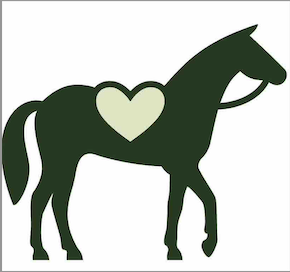
GallopNYC Therapeutic Horsemanship
80-98 Linden Blvd
HOWARD BEACH, NY 11414
Mailing Address:
16004 Crossbay Blvd PMB 256
HOWARD BEACH, NY 11414
Phone: 855-925-5661
MAKE AN INQUIRY
View our WEBSITE
EIN: 05-0615968Founded: 2005
View our PHOTO GALLERY
Profile Last Updated December 1, 2025Public Charity
Click here to view listing(s) of the program horses we are seeking

The Guardian Seal of Transparency is awarded annually to recognize an organization's commitment to transparency and accountability by their willingness to make comprehensive data about their programs, horse care practices, and governance available for public scrutiny. The Guardian Seal of Transparency is NOT an endorsement.
Last Updated: November 29, 2025
GallopNYC Therapeutic Horsemanship has not attained the Guardian designation for 2026.
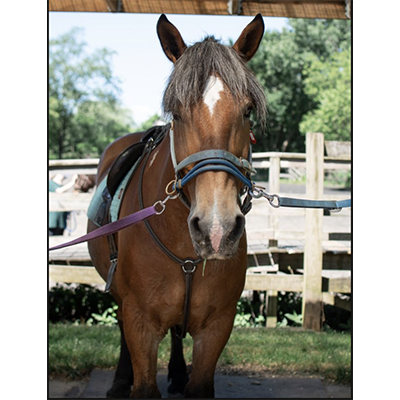
MISSION & PROGRAMS
Mission:GallopNYC is a nonprofit 501(c)(3) organization founded in 2005. Empowered by the collective support of our staff, volunteers, donors, and participants, GallopNYC provides therapeutic experiences with horses to facilitate personal development for New Yorkers with disabilities and others who benefit from our life-changing programs.
We leverage the power of horses to support people in learning new life skills and to thrive within their communities and families.
Our organization conducts Equine Assisted Services in accordance with the EQUUS Foundation Guidelines on Qualifications of Organizations Conducting Equine Assisted Services (EAS).
Our organization provides outreach and/or public education programs involving horses.
100% of our total programs and services are equine-related.
Our organization is directly responsible for the care and shelter of equines involved in our programs.
Our organization does not CURRENTLY use satellite, overflow, foster, and/or outreach facilities.
Please describe what steps your organization takes to ensure that:
1) all interactions between your equines and people are mutually beneficial and conducted in accordance with the Guidelines for Human-Equine Interactions stated below;
2) all equines in the care of our organization and/or equines that participate in the organization's program have access to clean drinking water at all times; nutritious food in sufficient quantity, including natural forage such as pasture grass and/or hay; appropriate veterinary, farrier, and dental care; shelter and protection from the weather; sufficient safe space to move around comfortably on a daily basis; and daily opportunity to freely interact and have contact with other equines:
GallopNYC's top priority is the health and happiness of the horses in our program. We consider not only if they are physically fit for therapeutic riding, but also that they are thriving and enjoying the service they perform for our riders. The equines selected for our program go through a rigorous selection process to ensure they are a good fit for participation.
The horses at GallopNYC always have access to clean drinking water, nutritious food, turnout with other equines, designated stalls, as well as routine vet, dental and farrier service.
The dedicated staff include an Equine Resource Manager, Barn Director, Barn Manager, Grooms, and PATH Int'l Certified Instructors to assess the needs of our horses and how to match riders and horses depending on temperament, size, riding level, etc. Additionally, we continually assess our horses condition before, during and after a lesson. If showing any signs of discomfort or stress, staff stop the lesson. In the event of an unforeseen emergency, all staff is trained on the written first aid plan in place. All staff receive training in horse first aid, and how to respond appropriately. Additionally, all instructors are CPR certified.
Our equine care plan aligns with our organizations' mission of boosting individuals self confidence because we want our riders to build relationships and independence with our equine partners while gaining respect and admiration for the transformative power of horses.
Equine Assisted Services (EAS) Overview:
Overview of our programs involved with providing EAS to individuals with special needs:
Our curriculum addresses both physical and mental health issues and is tailored to a wide set of needs. We serve people with disabilities and anyone who can benefit from working with horses, including veterans with PTSD, seniors, and children with autism, by providing therapeutic riding, non-mounted therapeutic engagement with horses and hippotherapy.
We harness the power of horses to and help our riders thrive within their communities and families. Therapeutic riding improves strength, communication skills, balance, mobility, and coordination while building self-esteem, valuable social-emotional skills, and increased independence.
GallopNYC Quick Facts:
● Located in Howard Beach, right in NYC, a country-style horse barn with contented horses and ponies, offering therapeutic and recreational riding in a large outdoor arena. Sunrise Stables is an urban stable with a rural feel.
● Serving 450+ participants each week: offer therapeutic horseback riding and unmounted sessions as well as groups for veterans, seniors and other specialized programs.
● Supported by 150 + dedicated weekly volunteers
● Every lesson is subsidized - tuition covers only one quarter of the true cost
● Over half of our participants receive financial aid.
● 54% of our riders identify as people of color
The therapeutic horsemanship programs at GallopNYC provide measurable benefits for people with developmental, emotional, social and physical disabilities. Through weekly riding sessions with PATH Intl. Certified Therapeutic Riding Instructors, we teach new skills, inspiring each rider to live life as fully, productively and independently as possible.
GallopNYC provides two, free unique equine programs for veterans. Riding for Veterans and Groundwork for Veterans. Veterans will have the opportunity to grow their confidence from learning to be in charge of a large herd animal, exercise their leadership skills by exploring alternative approaches to giving commands and demonstrate their competence by learning new skills.
GallopNYC is excited to welcome young equestrians to our 2025 Summer Camp—a fun and enriching week-long program designed for riders of all levels. Campers will enjoy daily horseback riding, hands-on horse care, and a variety of engaging outdoor activities that foster confidence, independence, and connection with animals and nature.
GallopNYC offers a free program at Sunrise Stables for local seniors, 65 and older. Participants have the opportunity to socialize and learn new skills by working with our horses and volunteering with our riders. Seniors learn to leadwalk and sidewalk, becoming invaluable volunteers in our therapeutic riding lessons.
Pony Club is open to New York City residents 3-21 years of age diagnosed with Autism Spectrum Disorders (ASD) and their families who are unable to access similar services funded by the Office for People with Developmental Disabilities (OPWDD) and/or other State agencies. The program offers a “Pony Club” style group session, working weekly through a curriculum that includes riding time and extensive group activities centered around horse care, horse handing, and behavior.
Equine Assisted Services (EAS) and Providers:
Our organization provides the following Equine Assisted Services (EAS):
Adaptive/Therapeutic Riding
Adaptive/Therapeutic Unmounted Horsemanship
Occupational Therapy/Physical Therapy/Speech-Language Pathology
20: Total number of Equine Assisted Service Providers at GallopNYC Sunrise Stables
1 Abigail Wellhouse
FACILITY PARTICIPATION:
GallopNYC Sunrise Stables
RELATIONSHIP: Employee
SERVICES PROVIDED:
Adaptive/Therapeutic Riding
Adaptive/Therapeutic Unmounted Horsemanship
DEGREES, LICENSES AND/OR CERTIFICATIONS
PATH Intl. Certified Therapeutic Riding Instructor (CTRI)
2 Alyse Burnside
FACILITY PARTICIPATION:
GallopNYC Sunrise Stables
RELATIONSHIP: Employee
SERVICES PROVIDED:
Adaptive/Therapeutic Riding
Adaptive/Therapeutic Unmounted Horsemanship
DEGREES, LICENSES AND/OR CERTIFICATIONS
PATH Int'l Certified Instructor
3 Bridgette Wentworth
FACILITY PARTICIPATION:
GallopNYC Sunrise Stables
RELATIONSHIP: Employee
SERVICES PROVIDED:
Adaptive/Therapeutic Riding
Adaptive/Therapeutic Unmounted Horsemanship
DEGREES, LICENSES AND/OR CERTIFICATIONS
PATH Int'l Certified Instructor
4 Catherine Grone
FACILITY PARTICIPATION:
GallopNYC Sunrise Stables
RELATIONSHIP: Employee
SERVICES PROVIDED:
Adaptive/Therapeutic Riding
Adaptive/Therapeutic Unmounted Horsemanship
DEGREES, LICENSES AND/OR CERTIFICATIONS
PATH Int’l CTRI
5 Dana Fairbairn
FACILITY PARTICIPATION:
GallopNYC Sunrise Stables
RELATIONSHIP: Employee
SERVICES PROVIDED:
Adaptive/Therapeutic Riding
Adaptive/Therapeutic Unmounted Horsemanship
DEGREES, LICENSES AND/OR CERTIFICATIONS
PATH Int'l CTRI
6 Dianne Garcia
FACILITY PARTICIPATION:
GallopNYC Sunrise Stables
RELATIONSHIP: Independent Contractor
SERVICES PROVIDED:
Occupational Therapy/Physical Therapy/Speech-Language Pathology
DEGREES, LICENSES AND/OR CERTIFICATIONS
PATH Int'l Registered Therapist in Hippotherapy; American Hippotherapy Association certified
7 Elizabeth Gallagher
FACILITY PARTICIPATION:
GallopNYC Sunrise Stables
RELATIONSHIP: Employee
SERVICES PROVIDED:
Adaptive/Therapeutic Riding
Adaptive/Therapeutic Unmounted Horsemanship
DEGREES, LICENSES AND/OR CERTIFICATIONS
PATH Int'l Certified Instructor
8 Emma Levine
FACILITY PARTICIPATION:
GallopNYC Sunrise Stables
RELATIONSHIP: Employee
SERVICES PROVIDED:
Adaptive/Therapeutic Riding
Adaptive/Therapeutic Unmounted Horsemanship
DEGREES, LICENSES AND/OR CERTIFICATIONS
PATH Int'l Certified Instructor
9 Emma Morris Downey
FACILITY PARTICIPATION:
GallopNYC Sunrise Stables
RELATIONSHIP: Employee
SERVICES PROVIDED:
Adaptive/Therapeutic Riding
Adaptive/Therapeutic Unmounted Horsemanship
DEGREES, LICENSES AND/OR CERTIFICATIONS
PATH Int'l Instructor in Training
10 Erin Kelly Meuchner
FACILITY PARTICIPATION:
GallopNYC Sunrise Stables
RELATIONSHIP: Employee
SERVICES PROVIDED:
Adaptive/Therapeutic Riding
Adaptive/Therapeutic Unmounted Horsemanship
DEGREES, LICENSES AND/OR CERTIFICATIONS
Path Int'l Instructor in Training
11 Kristen Quigley
FACILITY PARTICIPATION:
GallopNYC Sunrise Stables
RELATIONSHIP: Employee
SERVICES PROVIDED:
Adaptive/Therapeutic Riding
Adaptive/Therapeutic Unmounted Horsemanship
DEGREES, LICENSES AND/OR CERTIFICATIONS
PATH Int'l CTRI
12 Marie Varvaro
FACILITY PARTICIPATION:
GallopNYC Sunrise Stables
RELATIONSHIP: Employee
SERVICES PROVIDED:
Adaptive/Therapeutic Riding
Adaptive/Therapeutic Unmounted Horsemanship
DEGREES, LICENSES AND/OR CERTIFICATIONS
PATH Int'l CTRI
13 Marti Lubi
FACILITY PARTICIPATION:
GallopNYC Sunrise Stables
RELATIONSHIP: Employee
SERVICES PROVIDED:
Adaptive/Therapeutic Riding
Adaptive/Therapeutic Unmounted Horsemanship
DEGREES, LICENSES AND/OR CERTIFICATIONS
PATH Intl. Certified Therapeutic Riding Instructor (CTRI)
14 Melissa Diamond
FACILITY PARTICIPATION:
GallopNYC Sunrise Stables
RELATIONSHIP: Employee
SERVICES PROVIDED:
Adaptive/Therapeutic Riding
Adaptive/Therapeutic Unmounted Horsemanship
DEGREES, LICENSES AND/OR CERTIFICATIONS
PATH Int'l Certified Instructor-In-Training
15 Ming Liu
FACILITY PARTICIPATION:
GallopNYC Sunrise Stables
RELATIONSHIP: Volunteer
SERVICES PROVIDED:
Adaptive/Therapeutic Riding
Adaptive/Therapeutic Unmounted Horsemanship
DEGREES, LICENSES AND/OR CERTIFICATIONS
PATH Int’l CTRI
16 Renee Hirt
FACILITY PARTICIPATION:
GallopNYC Sunrise Stables
RELATIONSHIP: Employee
SERVICES PROVIDED:
Adaptive/Therapeutic Riding
Adaptive/Therapeutic Unmounted Horsemanship
DEGREES, LICENSES AND/OR CERTIFICATIONS
PATH Int'l CTRI
17 Reshma Ballie McGowan
FACILITY PARTICIPATION:
GallopNYC Sunrise Stables
RELATIONSHIP: Employee
SERVICES PROVIDED:
Adaptive/Therapeutic Riding
Adaptive/Therapeutic Unmounted Horsemanship
DEGREES, LICENSES AND/OR CERTIFICATIONS
PATH Int'l Certified Instructor
18 Shun Yamamoto
FACILITY PARTICIPATION:
GallopNYC Sunrise Stables
RELATIONSHIP: Volunteer
SERVICES PROVIDED:
Adaptive/Therapeutic Riding
Adaptive/Therapeutic Unmounted Horsemanship
DEGREES, LICENSES AND/OR CERTIFICATIONS
PATH Int'l Instructor in Training
19 Soorya Anilkumar
FACILITY PARTICIPATION:
GallopNYC Sunrise Stables
RELATIONSHIP: Employee
SERVICES PROVIDED:
Adaptive/Therapeutic Riding
Adaptive/Therapeutic Unmounted Horsemanship
DEGREES, LICENSES AND/OR CERTIFICATIONS
PATH Int’l CTRI
20 Yvonne Allaway
FACILITY PARTICIPATION:
GallopNYC Sunrise Stables
RELATIONSHIP: Employee
SERVICES PROVIDED:
Adaptive/Therapeutic Riding
Adaptive/Therapeutic Unmounted Horsemanship
DEGREES, LICENSES AND/OR CERTIFICATIONS
PATH Int'l CTRI
Outreach and/or Public Education:
We see our role as spreading the word about the power of horses to help people. We have a full collection of social media which we use to inform the public about our programs.
In addition, we have specific outreach programs:
We offer a Public Horse Education program, which extends free barn visits and horse education sessions to the general public on an appointment basis at our own facilities.
We also host open houses at the two stables we operate, generally twice a year at each, where neighbors are welcomed to our site for barn tours. Our bi-annual Horse Shows at our facilities are open to the public, as is our Central Park Promenade, which takes place in a public space at Central Park.
Virtual workshops on TR and horsemanship are open to volunteers and members of our community free of charge. We offer discounted price riding lessons to volunteers who have logged a set number of hours in order to empower and sustain a community of experienced volunteers.
We run a comprehensive Corporate Volunteering Program which allows us to strengthen our corporate partnerships as well as bring the benefits of therapeutic horsemanship to new audiences who would not otherwise get a chance to experience our programs. During a day of service, corporate groups not only undertake volunteer work - they also receive an introductory horse grooming and lead-walking lesson in order to educate them about horsemanship.
We hope to offer more educational opportunity for our New York City community in the future similar to the panels on therapeutic horsemanship offered to Citi and Ernst & Young employees at their office locations in 2023.
Research/Medical Use of Equines:
Our organization has never made, and would not ever consider making, equines available for research studies or medical training that involves invasive procedures and/or that which may cause pain or suffering to the equine.
Religious Affiliation:
Our organization does not promote religious education, religious purposes, or a specific religious faith or use donations for religious education or religious purposes; require participants to be of a certain faith; require participation in religious, instruction, activities or services; or require participation in prayer, worship, religious instruction or other religious activities as a condition of receiving social or secular services offered.
Auction Donation:
Our organization has never allowed, or would not consider allowing, an equine to be sold, transferred, released, or otherwise placed into possession of any person or organization that would cause or allow the equine to be sold at auction for slaughter.
Our Programs/Activities that are not equine-related and/or involving animals other than equines:
GallopNYC’s workforce development initiative, HERD: Harnessing Empowerment and Realizing Dreams, provides participants with a supportive employment environment which facilitates their transition into the workforce. Each participant learns valuable hard technical skills related to roles in animal caretaking, client-facing roles, and administration, as well as soft skills such as communication and social interaction. While horses are the heart of all our programs, participants in the HERD program learn valuable skills that may not be 100% equine-related such as office administration or database work.
POLICIES: INTAKE, ASSESSMENT & TRAINING
Prior to a horse being accepted and/or arriving at the facility, the organization has the following policies in place:The owner of a potential equine is interviewed over the phone or in person prior to seeing the equine
The equine is evaluated at its place of residence
The owner completes an application/contract which constitutes the agreement between the owner and our organization when the equine is acquired from the equine's owner other than by seizure or by abandonment
If health records are not available or are out-of-date, our veterinarian will administer appropriate vaccinations
A health certificate signed by a veterinarian and dated no more than seven days prior to arrival is provided to our organization either prior to or upon arrival of the equine attesting to the health status of the equine
The owner is financially responsible for the shipping of the equine to and from the organization
Trial Period: Check all that apply:
Equines are on trial up to 60 days
During the trial period, the organization accepts total financial responsibility for the care of the equine, including board, feed, shoeing and any necessary veterinary care
The trial period may be terminated by either the organization or the owner for any reason
Equines are on trial for up to 30 days
Equines are on trial for 60 or more days
The trial period may be reduced based on the equine's progress
During the trial period, the organization accepts financial responsibility for the care of the equine, including board, feed, shoeing and any necessary veterinary care, up to a fixed amount agreed upon by the organization and the owner
During the trial period, the owner/donor is financially responsible for the care of the equine, including board, feed, shoeing and any necessary veterinary care
Upon intake, the organization has the following quarantine policy in place:
The equine is confined to a designated and separate area for isolation and quarantine at the facility for a prescribed period of time
The equine is confined to a designated and separate area for isolation and quarantine off-site for a prescribed period of time
The equine is not quarantined
The typical length of quarantine is: 10 to 20 days
Following arrival of the equine at the facility, the following is performed:
Physical examination to include temperature, pulse and respiration by a veterinarian upon arrival
Physical examination to include temperature, pulse and respiration by a trained staff member upon arrival
A Henneke Body Conditioning Score or other body conditioning score is assigned by a trained staff member upon arrival
Photographs are taken of each equine upon arrival at the facility and kept with the equine's health records
Physical examination by a farrier
Physical examination by a dentist
A Henneke Body Conditioning Score or other body conditioning score is assigned by a veterinarian upon arrival
The equine is microchipped if the equine has not been microchipped
Horses are assessed for following skills and behaviors:
Retrieval from a pasture/paddock
Leading with a halter and lead rope
Temperament, disposition and attitude, such as rated from very calm to very high spirited
Saddling
Bridling
Lunging
Loading onto and unloading off a trailer
Mounting and dismounting
Riding at the walk
Riding at the trot
Riding at the canter
Riding by a beginner and/or unbalanced rider
Tolerance to unusual objects and loud noises
Known vices, i.e., cribbing, biting, kicking, weaving, stall walking, etc
Grooming
Bathing
Clipping
Tolerance to multiple handlers at the same time
Jumping
Driving (Pulling a carriage)
Our organization has the following policies and procedures in place pertaining to the ongoing assessment of horses in its care:
Physical examination by a veterinarian at least annually
The Henneke Body Condition score or other body conditioning score is updated at least annually by the veterinarian
The Henneke Body Condition score or other body conditioning score is updated at least annually by a trained staff member
Vaccinations are administered at least annually
Photographs are taken of each equine annually and kept with the equine's health records
Equines at our facility may be treated by an equine chiropractor
Equines at our facility may be treated by an equine massage therapist
Equines at our facility may be treated by an equine nutritionist
Photographs are taken of each equine monthly and kept with the equine's health records
Equines at our facility may be treated by an equine acupuncturist
Our organization has the following policies and procedures in place pertaining to the weight-carrying or workload capabilities of horses/equines that are ridden in our care:
Our organization evaluates the weight-carrying and workload limitations for each equine that is ridden at least annually
Our organization maintains a written record of the weight-carrying and workload limitations for each equine that is ridden
Our organization does not evaluate the weight-carrying and workload limitations for each equine that is ridden
No equines are ridden; not applicable
The following variables are considered in determining the weight-carrying and workload limitations for each equine that is ridden:
Equine age, weight, breed, body condition, fitness, balance, health and soundness
Equine conformation to include the top line, length of back, strength and width of loin, bone density (measured by the circumference of the cannon bone just below the knee)
Size, shape, condition and angle of the hooves
Participant weight, height, body proportions, balance, fitness and riding skills as well as behavioral issues and safety concerns
Weight and proper fit of the saddle and other equipment
Terrain and footing in the working environment
Duration and frequency of working sessions, as the frequency with which an equine is subjected to maximum weight carrying and/or workload
Nature and pace of work, repetitive or varied, radius of turns, degree of incline and regularity of footing when equine is subject to maximum weight-carrying capacity
Temperature and/or weather conditions
Seasonal impact on the equines' workload and weight-carrying capabilities and limitations
Our organization does not evaluate the weight-carrying and workload limitations for each equine that is ridden
No equines are ridden; not applicable
Horses provided formal training (groundwork or riding): Daily
POLICIES: BREEDING
The organization has the following policies related to breeding and stallions:Our organization does not conduct breeding of equines owned or under the care of our organization.
The main facility where our organization conducts its programs does NOT breed equines.
One or more of the facilities where our organization conducts its programs, including foster/temporary care facilities, breeds equines
One or more of the facilities where our organization conducts its programs, including foster/temporary care facilities, are permitted to house stallions
Additional information about our breeding policies and practices:
GallopNYC does not run a breeding program at any of the facilities we operate.
POLICIES: EUTHANASIA
The organization has the following policies related to euthanasia:Our organization will never have an equine euthanized for space
Our organization will have an equine euthanized upon the recommendation of the veterinarian if the equine is a threat to itself, other equines, or people
Our organization will have an equine euthanized upon the recommendation of the veterinarian after all reasonable treatment options have been explored
Euthanasia is done on site when possible to decrease trauma from transport
Disposal of the carcass is handled within 24 hours
Our organization will never have an equine euthanized under any circumstances
Euthanasia is done at the veterinarian's facility
The following are authorized to administer the procedure for your organization in accordance with state laws:
Veterinarian
A certified euthanasia technician
Senior staff with appropriate training
Employee of animal control shelter or humane society with appropriate training
Veterinary student under the supervision of a licensed veterinarian
Not applicable. Our organization prohibits euthanasia under any circumstances
POLICIES: RE-HOMING
View Re-homing AgreementOur organization has the following re-homing (adoption/purchase) policies and procedures in place:
All potential adopters/purchasers complete a written contract which constitutes the agreement between our organization and the new owner
Our organization does NOT re-home an equine to first time equine owners
Our organization will only re-home an equine to a location where another equine resides
Potential adopters/purchasers must visit our organization and be observed with the equine on site
The distance of a potential adopter/purchaser's home from our facility is a consideration for when re-homing an equine
Our organization conducts a site visit of the adopter/purchaser's facility before the transfer of the equine to the adopter/purchaser's facility
Potential adopters/purchasers are encouraged to do a short-term, on-site foster with the equine
Adopters/purchasers are NOT required to provide updates
Our organization has the following policies and procedures related to horses that need to be retired, are no longer able to contribute to the mission of the organization, and/or are no longer manageable:
Equines may be found suitable homes by our organization
Equines may be returned to their owners
In the case an equine is unmanageable and demonstrates repeated dangerous behaviors, the equine may be euthanized upon the recommendation of the veterinarian
In the case an equine is unsound and/or unhealthy and cannot be treated to relieve suffering, the equine may be euthanized upon the recommendation of the veterinarian
Equines may remain at our organization for their lifetimes
Equines may be sent to auction
If a suitable home cannot be located within 12 months, the equine may be euthanized
The organization will accept financial responsibility for equines in the current care of the organization that need to be retired or are no longer able to contribute to the mission of the organization if all alternatives have been explored to find the equine an appropriate placement and space is not available for the equine to remain at the organization.
The uploaded Re-homing agreement includes the following re-homing (adoption/purchase) statements:
The agreement reflects that any individual or organization in possession of the equine as of the date of the agreement and any time thereafter is bound to not sell the equine at auction for slaughter or allow the equine to be sold, transferred, released, or otherwise placed into possession of any person or organization that will cause or allow the equine to be sold at auction for slaughter.
The agreement states that should the adopter decide to re-home the equine, our organization must grant approval of any individual or organization intending to take possession of the equine for any reason prior to the equine being placed into the possession of such individual or organization, including being provided written notification of the name, address, and telephone number of any individual or organization intending to take possession of the equine for any reason.
The agreement states that the terms of our organization's agreement will be binding on any future individual or organization taking and/or in possession of the equine for any reason.
The agreement states that re-homed equines cannot be bred
The agreement states that if there is any breach of contract the equine must be returned to our organization
The agreement states that our organization reserves the right to make scheduled visits
The agreement states that adopters/purchasers can return an equine to our organization free of charge
The agreement states that the re-homed equine CANNOT be sold, adopted, transferred, auctioned, released, given away, or otherwise placed into the possession of another individual or organization under any circumstances and must be returned to our organization should the adopter decide that he/she is no longer able, or no longer wishes, to care for the equine.
The agreement states that should the adopter decide to re-home the equine, the adopter must grant the organization first right of refusal prior to the equine being placed into the possession of any individual or organization intending to take possession of the equine for any reason.
The agreement states that should the adopter decide to re-home the equine, our organization must be notified of the name, address, and telephone number of any individual or organization intending to take possession of the equine for any reason prior to the equine being placed into the possession of such individual or organization.
The agreement states that our organization reserves the right to make unannounced visits
The agreement states that adopters/purchasers can return an equine to our organization for a fee
The agreement states that adopters/purchasers are required to provide updates (photos, vet records) for one year
The agreement states that adopters/purchasers are required to provide updates (photos, vet records) for two years
Our organization microchips all equines that are not already microchipped before the adoption and/or transfer of the equine if the organization has the authority to microchip the equine.
The agreement includes the microchip number of the equine.
The agreement states that adopters/purchasers are required to provide updates (photos, vet records) for as long as the adopter/purchaser is responsible for the care of the equine
None of the statements are included.
The organization does not re-home equines under any circumstances; our organization retains custody of our equines and ensures care of the equines for their lifetimes.
Our organization does not have the authority to transfer ownership and/or does not own any of the equines involved with our programs.
Our organization requires references from the following:
Veterinarian
Personal/Other
Farrier
Not applicable or no references required.
Transfer of ownership occurs: Immediately (at the time of adoption/purchase) or less than one year
The average equine re-homing (adoption/purchase) fee received by your organization:
None received
Additional information about our rehoming policies and practices:
While we don't retain ownership of rehomed horses, we require that horses return to GallopNYC if a change is necessary in their circumstance.
We have on occasion returned horses to their owners after they are no longer useful to us, if this was agreed to by the owner.
EQUINE CARE & SHELTER/FACILITY INFORMATION
Our organization does not CURRENTLY use satellite, overflow, foster, and/or outreach facilities.Total facilities at which our organization cares for and shelters horses used in our programs: 1
GallopNYC Sunrise Stables
80-98 Linden Blvd. Howard Beach NY 11414
Currently operational
Total number of horses/equines currently involved with your programs, under your care, and/or owned by your organization at this facility: 17
Total number of horses at this facility NOT INCLUDING those counted above: 2
Maximum capacity of horses at this facility: 24
Does your organization own, lease or use a part of this facility? Lease
Provide the contact information for the individual or organization responsible for investigating abuse in the county where the facility is located, including mailing address, email address, and phone information.
ASPCA 520 8th Ave., 7th Fl. New York, NY 10018 Phone: (212) 876-7700, ext. 4450 Website: http://www.aspca.org/aspca-nyc.aspx
Does your organization conduct Equine Assisted Services (EAS) at this facility in accordance with the EQUUS Foundation Guidelines on Qualifications of Organizations Conducting Equine Assisted Services (EAS)? Yes
Total number of Equine Assisted Service Providers AT THIS FACILITY, including instructors, specialists, therapists, counselors, coaches and/or facilitators (full-time, part-time, volunteer, independent contractors, and/or providers accompanying clients) that conduct Equine Assisted Services (EAS) in accordance with the EQUUS Foundation Guidelines on Qualifications of Organizations Conducting Equine Assisted Services (EAS) AT THIS FACILITY: 20
Equine Assisted Service Providers Assigned to this Facility: (see Equine Assisted Service Provider Section below for details)
1. Abigail Wellhouse
2. Alyse Burnside
3. Bridgette Wentworth
4. Catherine Grone
5. Dana Fairbairn
6. Dianne Garcia
7. Elizabeth Gallagher
8. Emma Levine
9. Emma Morris Downey
10. Erin Kelly Meuchner
11. Kristen Quigley
12. Marie Varvaro
13. Marti Lubi
14. Melissa Diamond
15. Ming Liu
16. Renee Hirt
17. Reshma Ballie McGowan
18. Shun Yamamoto
19. Soorya Anilkumar
20. Yvonne Allaway
Veterinarian Information: GallopNYC Sunrise Stables (*Main) Currently operational
Veterinarian: Michael Aromando
Clinic Name: Town and Country Veterinary Service
98 Ford Rd, Suite 3A
Denville NJ 07834
Phone: 973-335-123
Grounds: GallopNYC Sunrise Stables (*Main) Currently operational
Total acreage dedicated specifically to the horses: 5
Our organization has use of the following at this facility:
Structures/Barns: 2 Run-in sheds: 3
Pastures: 5 Paddocks/Pens/Turnout Areas: 6
Uncovered Outdoor Rings: 8 Covered Outdoor Rings: 0 Indoor Rings: 0
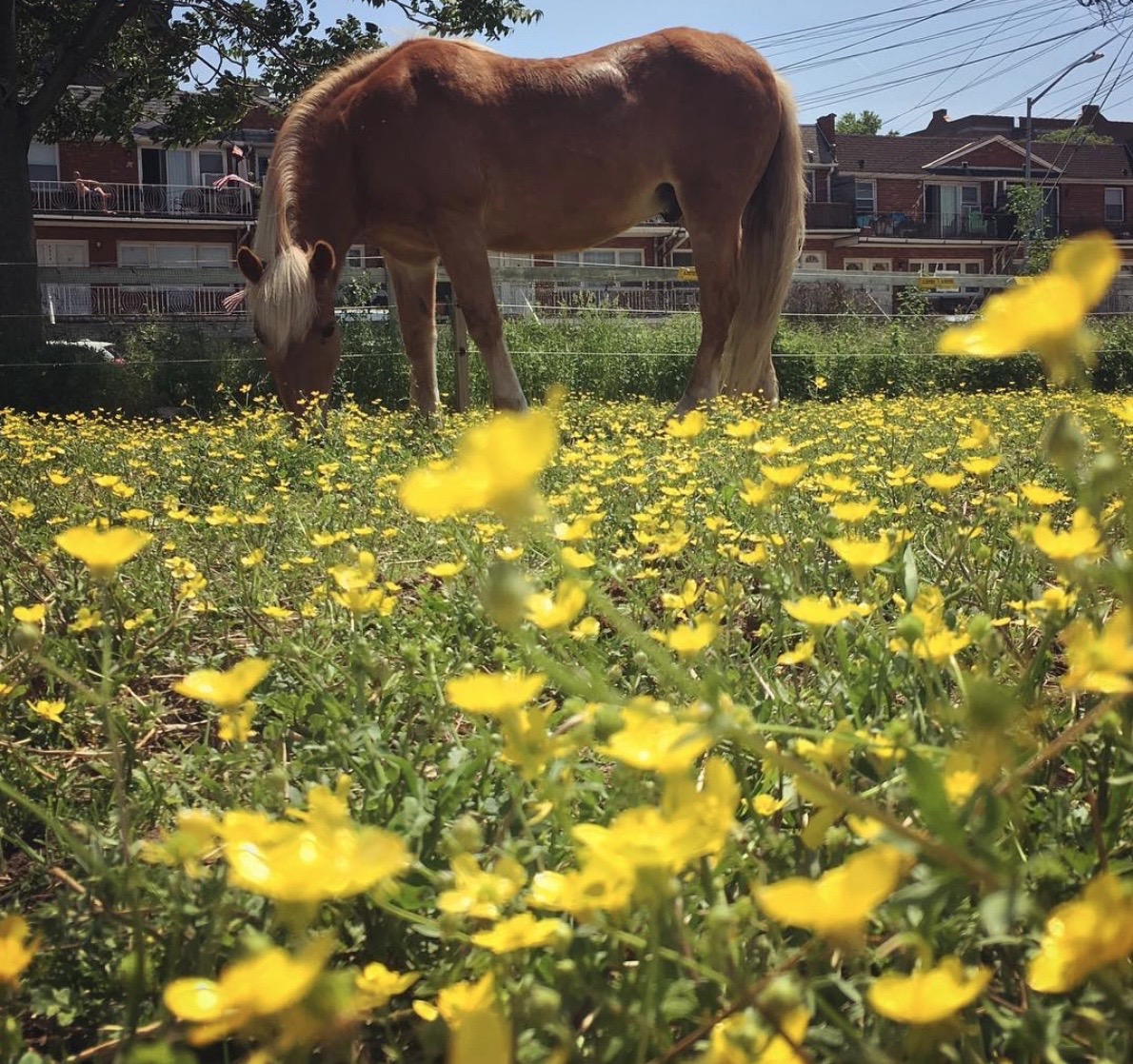
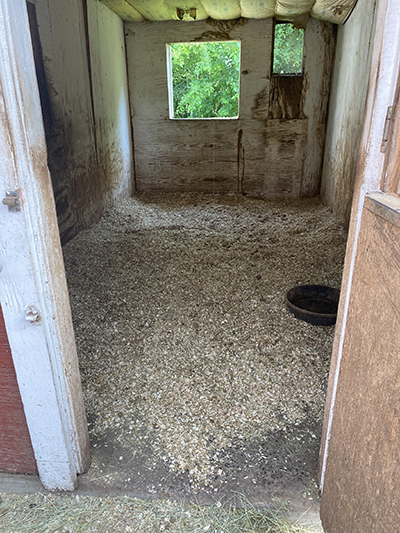
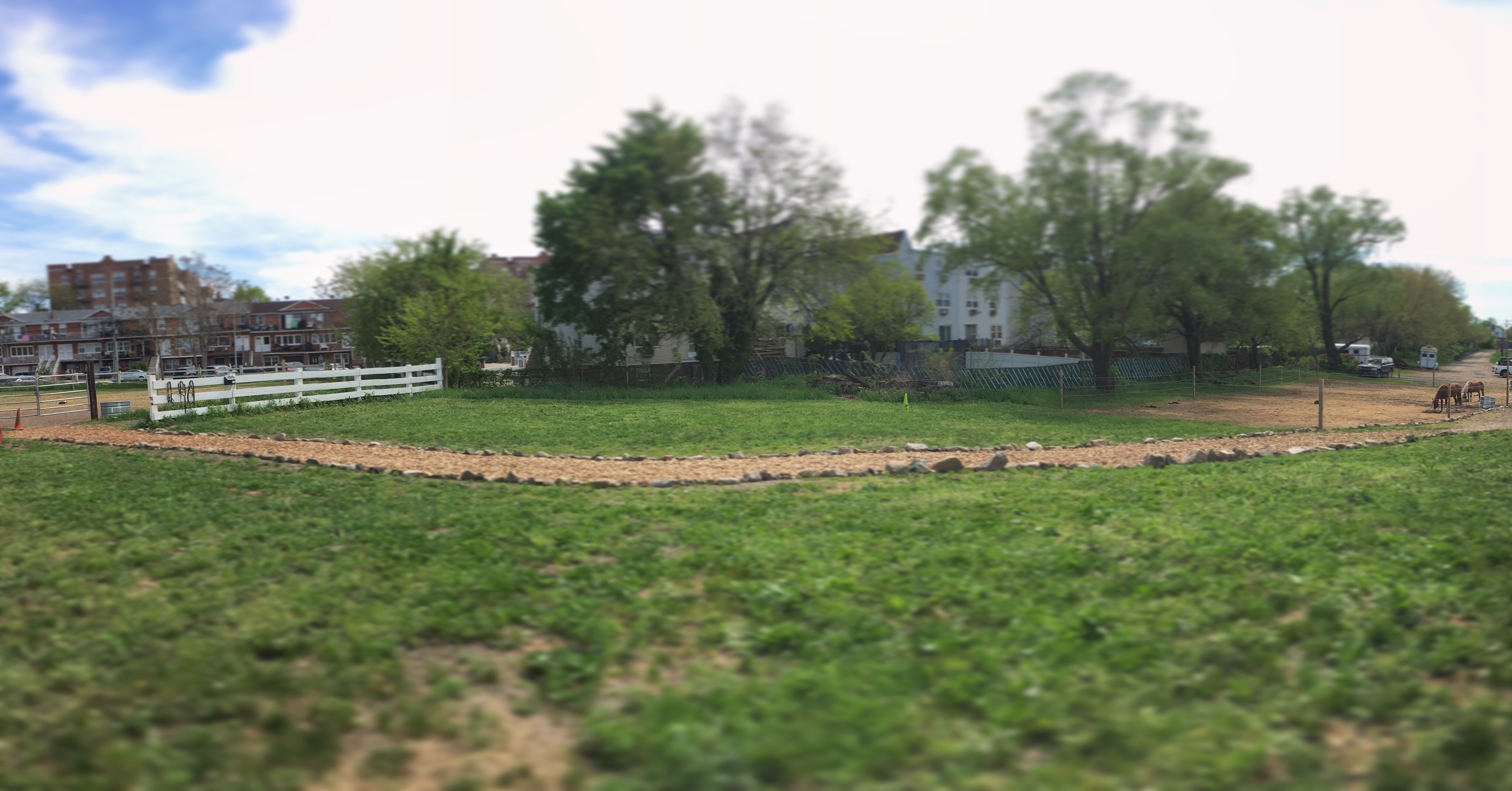
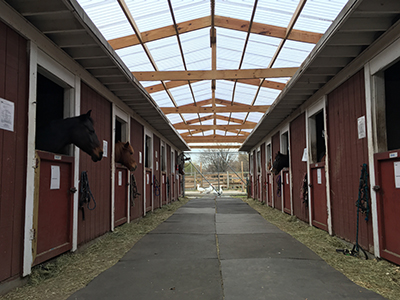
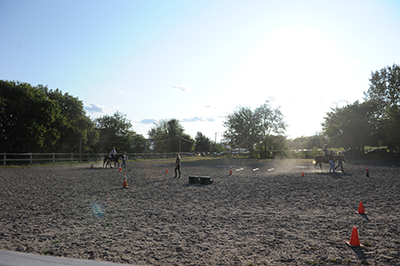
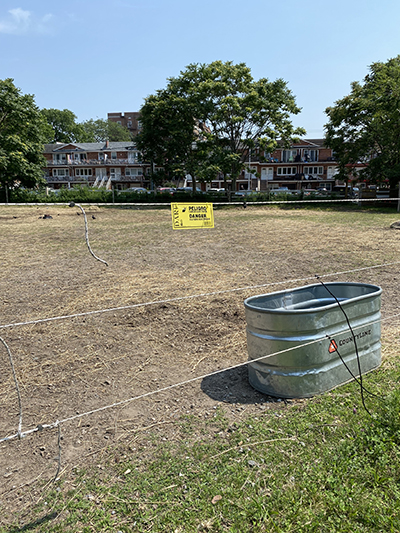
Are the organization's rules, restrictions and warnings (signage) conspicuously posted in easily accessible locations? Yes
Are the organization's emergency contacts, including veterinarian contact information, conspicuously posted in easily accessible locations? Yes
Are human and equine first aid kits easily accessible? Yes
Regarding all shelters where horses are housed including run-in sheds:
Do horses have assigned stalls in the barn/structure(s) or exclusively assigned shelter locations where they are separated from other horses with a barrier? Yes
How many hours per day, on average, are horses stalled or restricted to these sheltered exclusive shelter locations? 9-12
How often are the stalls/shelters cleaned, i.e., kept in good repair and free of standing water, accumulated waste, sharp objects and debris? 6-7 Days a Week
Do all stalls/shelters allow horses to lie down, stand up and turn around and provide protection from inclement weather (wind, sleet, rain, snow and extreme temperatures)? Yes
Are stalls/shelters kept in good repair, with adequate ceiling height, and free of standing water, accumulated waste, sharp objects and debris? Yes
Are floors constructed and maintained for both good drainage and traction? Yes
Is there a ventilation and circulation system in place to allow free flow of air to control temperature, and humidity, and to prevent air stagnation? Yes
Is wiring inaccessible to horses and maintained for safety in all areas of facility? Yes
Are fire prevention/protection measures (fire alarms, extinguishers and sprinkler systems) maintained and in good working order? Yes
Is there adequate lighting to ensure safety in all areas of facility? Yes
How many hours per day, on average, are horses turned out:
Equines are out 4 to 8 hours per day
The following describes the pastures at this facility:
A dedicated staff person(s) is responsible for pasture management
All pastures are fenced to prevent escape or injury
Electric fencing is used; electric wires or tape fence are visibly marked
Fencing checks, such as broken or missing planks, loose fence posts, exposed or loose nails, detached wires, etc., are done regularly
Pastures have natural protection for equines (i.e., trees)
This facility does not have pastures where equines can graze on pasture grass
This facility has a written plan in place for pasture management, which includes guidelines for seeding, fertilizing, irrigation, mowing, dragging, harrowing, manure removal, removal of debris, the control of poisonous plants, and a schedule for cleaning
Barbed wire is used for fencing
Pastures are rotated
Pastures have man-made protection for equines (i.e., shelters)
The following describes the turnout areas other than pastures at this facility:
A dedicated staff person(s) is responsible for the maintenance of turnout areas
All turnout areas are fenced to prevent escape or injury
Electric fencing is used; electric wires or tape fence are visibly marked
Fencing checks, such as broken or missing planks, loose fence posts, exposed or loose nails, detached wires, etc., are done regularly
This facility does not have turnout areas
This facility has a written plan in place for the maintenance of turnout areas, which includes a schedule for cleaning, manure removal, and dragging
Barbed wire is used for fencing
Turnout areas have man-made protection for equines (i.e., shelters)
The following policies and procedures are in place at the facility to restrict public access and to keep horses safe:
There is a mechanism in place to monitor equines overnight
No Trespassing signs are posted
Hold Harmless signs are posted
Authorized Personnel Only signs are posted
Entrance gates are locked at night
Visitors are only permitted at specific times
Visitors are only permitted in specific areas
The property is fitted with motion lights
The property is fitted with a security system that is monitored internally by staff (or the property owner)
The perimeter of the property is fully fenced
The property owner, staff member or caretaker lives on the premises and ensures that public access is restricted and is responsible for the security of the facility and equines
A security guard is present at night
By Appointment Only signs are posted.
The property is fitted with a security system monitored by police or a professional service
Equine Care/Emergency Preparedness: GallopNYC Sunrise Stables (*Main) 2026 and 2025 This section is required.
Horse Health Care/Barn Management Records: What system is used to collect and store health/horse care records?
Onsite computer with cloud-based backup storage system
The organization utilizes its own system to maintain records
The following items are consistent with our feed management plan and practices:
Equines are provided with individualized feeding plans, including supplements, according to the equine's age, breed/type, condition, size, work level and any health issues, consisting of nutritious food provided in sufficient quantity and access to adequate natural forage, or be fed daily, or as recommended by the organization's veterinarian
Feed plans are determined in consultation with a veterinarian
Supplement plans are determined in consultation with a veterinarian
Equines are fed grain in individual stalls
Staff and/or volunteers are trained in proper feed measurements and protocols and observed periodically to ensure they are feeding correctly
The feed chart is centrally located and updated as needed
The area(s) where hay, feed, grain, and supplements are stored are kept clean, free of debris and chemicals, and protected from weather and other animals in rodent-proof and mold-proof containers and grain bins
Feed, supplements and hay types are clearly labeled
Water sources, i.e., buckets, troughs, automatic waterers, etc. are kept clean, free of contaminants, debris and chemicals, protected from weather and other animals, and be positioned or affixed to minimize spillage.
Medications are kept in a secure area
Equines are fed grain in groups
Is clean, potable water available at all times for all equines? Yes
Hoof Care: How often is hoof care provided for each equine? Every 4-8 weeks and when an issue arises
Dental Care: How often is dental care provided for each equine? Annually and when an issue arises
Horse checks: How often are equines visually and physically checked by personnel at the facility? Every day or 6 days a week
Our organization has the following parasite and fly/insect control protocols in place, including remedies used to control flies and insects:
Our organization follows the parasite control guidelines of our veterinarian, including fecal testing and de-worming
Fly/Insect Control Remedies:
Fly parasites
Fly Traps and Tapes
Fly Spray Repellent
Fly Masks
Fly Sheets
Fans
The following represent the biosecurity practices in place at facility:
Our organization follows the biosecurity guidelines of our veterinarian
Sick, affected and/or quarantined equines do not have contact with other equines or other animals
The organization has a written biosecurity plan
Staff are trained in best practices related to biosecurity
Restricted access signs are posted at primary points of access to sick, affected and/or quarantined equines
Hand sanitizers are available at all primary points of access to sick, affected and/or quarantined equines
Footbaths are available at all primary points of access to sick, affected and/or quarantined equines
Manure and bedding from sick, affected and/or quarantined equines is removed from the facility - not put in open air piles, and not spread on pastures
Quarantine areas, such as stalls, aisle ways, paddocks, and common areas, are cleaned (and needed, disinfected) after conclusion of the quarantine.
Trailers/vans used by sick, affected and/or quarantined equines are cleaned and disinfected after each use and cleaning takes place away from where equines are sheltered
Equipment used by sick, affected and/or quarantined equines is not shared
Equipment used by sick, affected and/or quarantined equines is cleaned of organic debris and disinfected after each use
Latex gloves, or equivalent gloves, are worn when working with sick, affected and/or quarantined equines
Volunteers are trained in best practices related to biosecurity
A specific individual is trained and assigned to care for sick, affected and/or quarantined equines
Sick, affected and/or quarantined equines are cared for last if the caretaker must also care for healthy equines
Equines are not quarantined on arrival.
Additional information on biosecurity:
When staff, volunteers, or visitors come back to GallopNYC's facilities after visiting any other barn, we request that they wear clean clothes and disinfect their boots in a footbath.
The following represent the manure removal practices in place at facility:
Manure is stored in dumpster(s)
Manure is hauled, sold or given away
Our organization adheres to the manure management guidelines set by the state, local authorities, and/or our organization's veterinarian
Manure is piled in an area where equines are not located
Manure piles are covered
Manure piles are composted or spread on pastures
The following steps are taken to help staff and volunteers readily identify each horse on the property:
Equines are assigned the same exclusive stall/shelter location each day
Name plates are located on the stall/shelter location
Equines wear halters with nametags
Equine photos and profiles are available on the website
Staff and volunteers are provided with an information packet with equine profiles, including photos and detailed descriptions
Staff/volunteers are provided training on conformation, markings, colors, and breeds
Team leaders work with new staff/volunteers until they are able to identify the equines
Photos are located on the stall/shelter location
A notebook or binder with photos and information on each equine is easily accessible
A map/diagram is posted showing the location of each equine with equine names and photos
Our organization has the following policies and procedures in place pertaining to tack, apparel and equipment:
All equines have specifically assigned apparel, equipment and tack (saddles/bridles if ridden) that is not shared
Blankets, sheets and turn out apparel are cleaned regularly as needed
Riding Tack is always cleaned at least weekly
Riding Tack is inspected for overall working condition before each use by trained personnel
Riding Tack is assessed for fit before each use by trained personnel
Riding Tack is assessed for fit by trained personnel when an equine's body condition changes
Riding Tack is assessed for fit by trained personnel when an equine's disposition changes
Assigned riding tack is clearly labeled
Helmets are shared
Helmets are cleaned/disinfected after each use
Helmets are replaced after a fall
Helmets are replaced at least every five years.
Saddles are shared
Saddle pads are shared
Bridles are shared
Bits are shared
Blankets are shared
Sheets are shared
Turnout apparel is shared
Blankets, sheets and turn out apparel are fitted and utilized for each equine appropriate to the equine's needs and the weather conditions
Halters are shared
Riding Tack is always cleaned after each use
Riding Tack is cleaned only when needed
This facility enlists the services of a professional saddle fitter at least once a year
Riding Tack is stored in a climate-controlled location
No equines are ridden; saddles, bridles, etc. not applicable.
Emergency Preparedness: GallopNYC Sunrise Stables: *Main This section is required.
The following plans, policies, and procedures are in place at the facility to handle emergencies and address weather related issues, fire safety procedures, and/or any additional hazardous scenarios the facility could potentially experience:
Emergency procedures are posted prominently
The facility owns or has access to a generator
The facility maintains at least two weeks of hay, feed, shavings and medications
The facility collects and maintains medical information from staff, volunteers, and clients
The facility maintains appropriate liability and/or workers' compensation insurance
The organization has a written emergency preparedness/safety plan (EPP)
Local fire department and/or the state's emergency planning department procedures
Medical emergencies for clients, staff, and volunteers
Medical emergencies for equines
Evacuation plans
Power outages
Fire
Natural Disasters - thunderstorm, hurricanes, earthquakes, tornados, etc
Protocols to notify emergency personnel
Building/facility exit plans
Terrorist attacks
The facility follows the specific procedures to help PREVENT emergency situations:
Smoking is strictly prohibited
NO SMOKING signs are posted prominently
Hay is stored away from permanent or temporary structures where equines are stalled
Permanent or temporary structures where equines are stalled are kept free of dust, cobwebs, trash, cleaning rags, and other flammable items
Aisles and doorways are kept clear
Heaters with automatic shutoff settings are used
How often are the following checked or performed?
Fire Extinguishers are checked: Annually
Smoke detectors are checked: Annually
Fence lines are checked: Weekly
Turnout Areas are checked: Daily
Sprinkler systems are checked: Not at all/NA
Fire drills are conducted: Quarterly
Review of safety protocols with staff are conducted: Quarterly
Review of safety protocols with volunteers are conducted: Quarterly
The Emergency Preparedness Plan is reviewed and updated: Annually
Equine Transportation: 2= Onsite: 2 (2 + 0) + Offsite: 0
2-horse van/trailer with truck:
1 Owned onsite
4-horse van/trailer with truck:
1 Owned onsite
© Copyright 2018 EQUUS Foundation 39 3.00